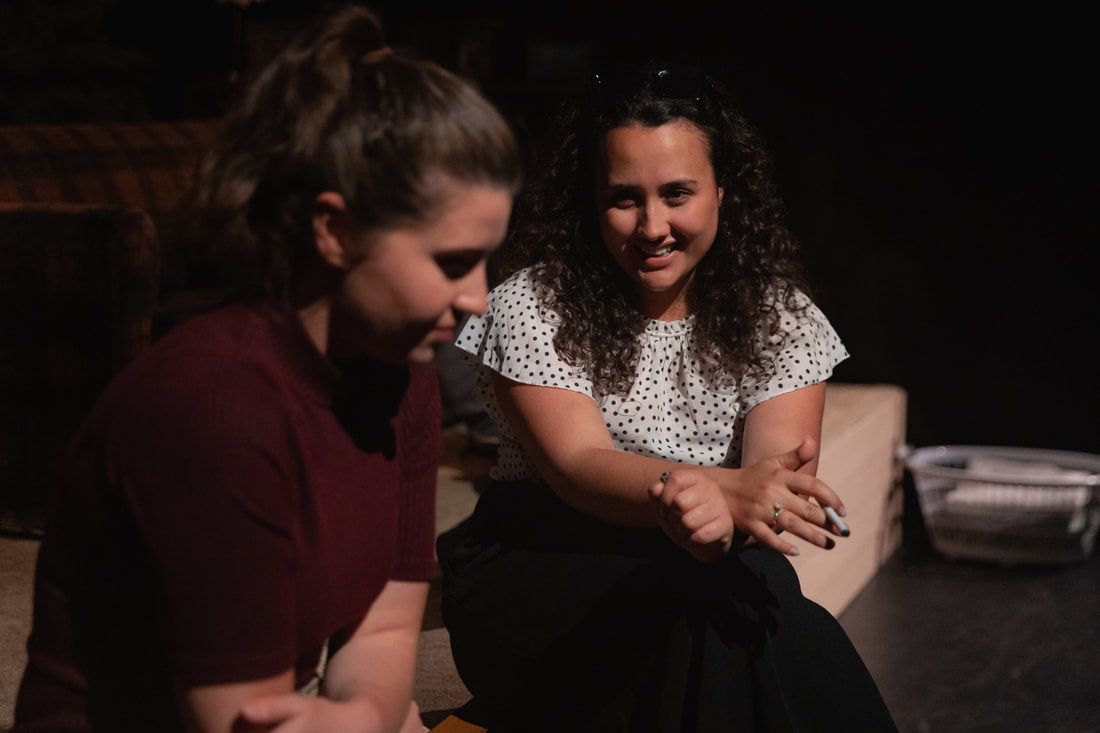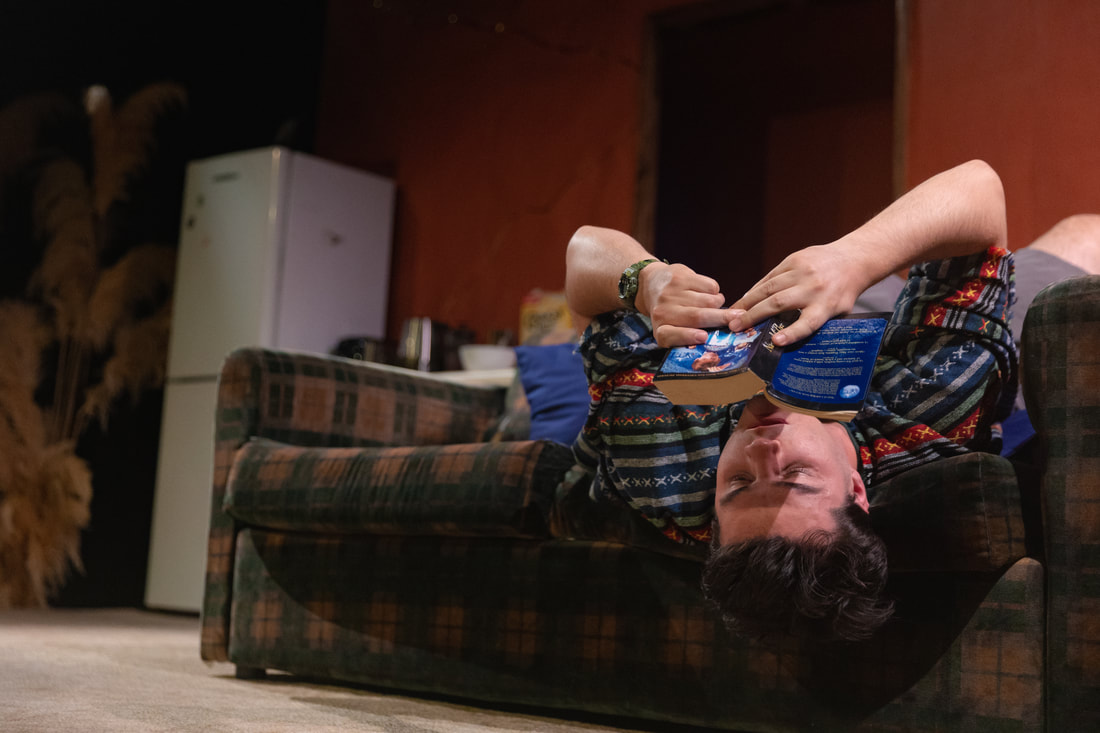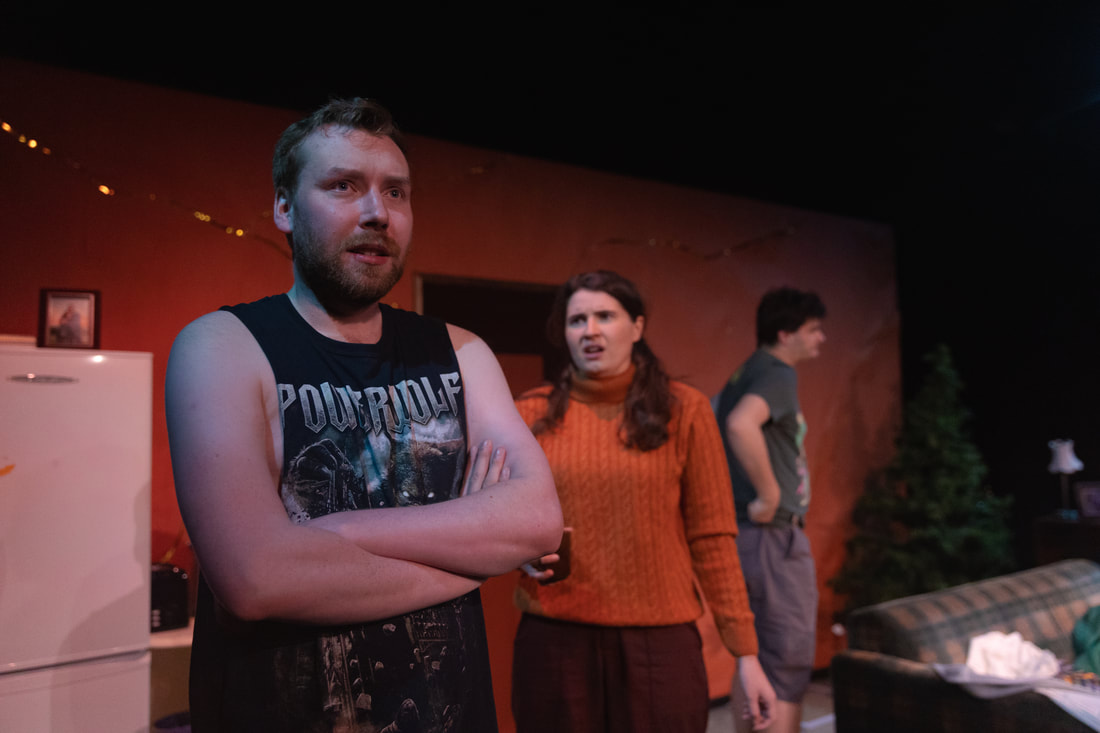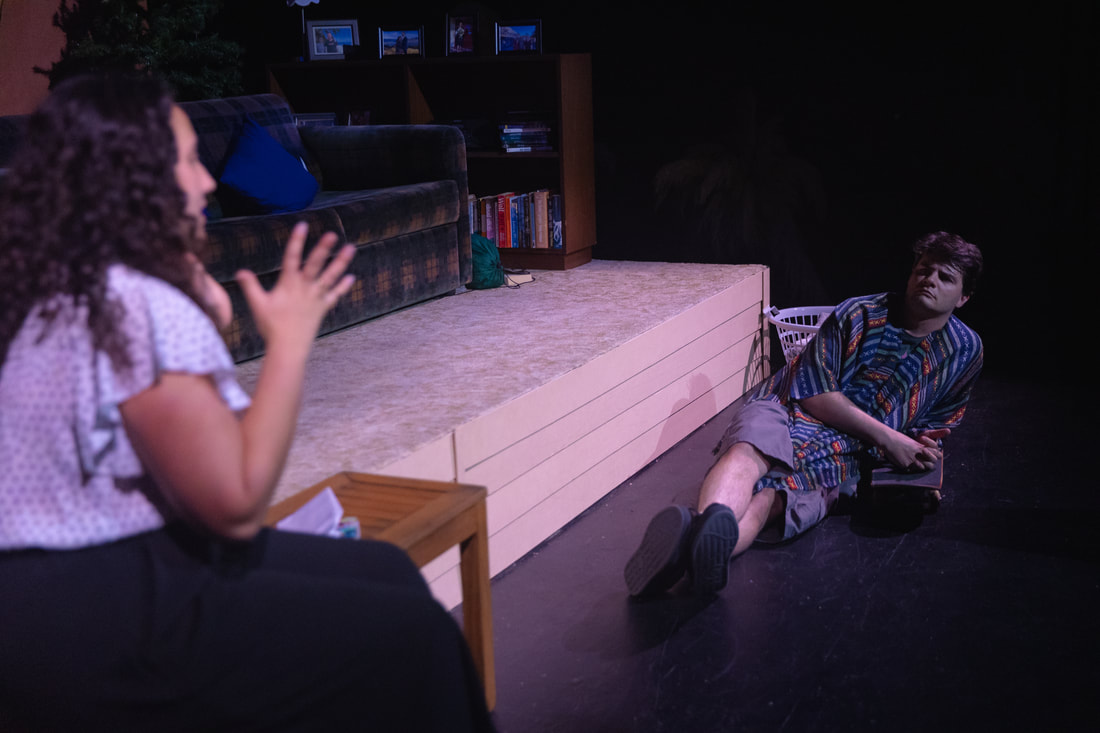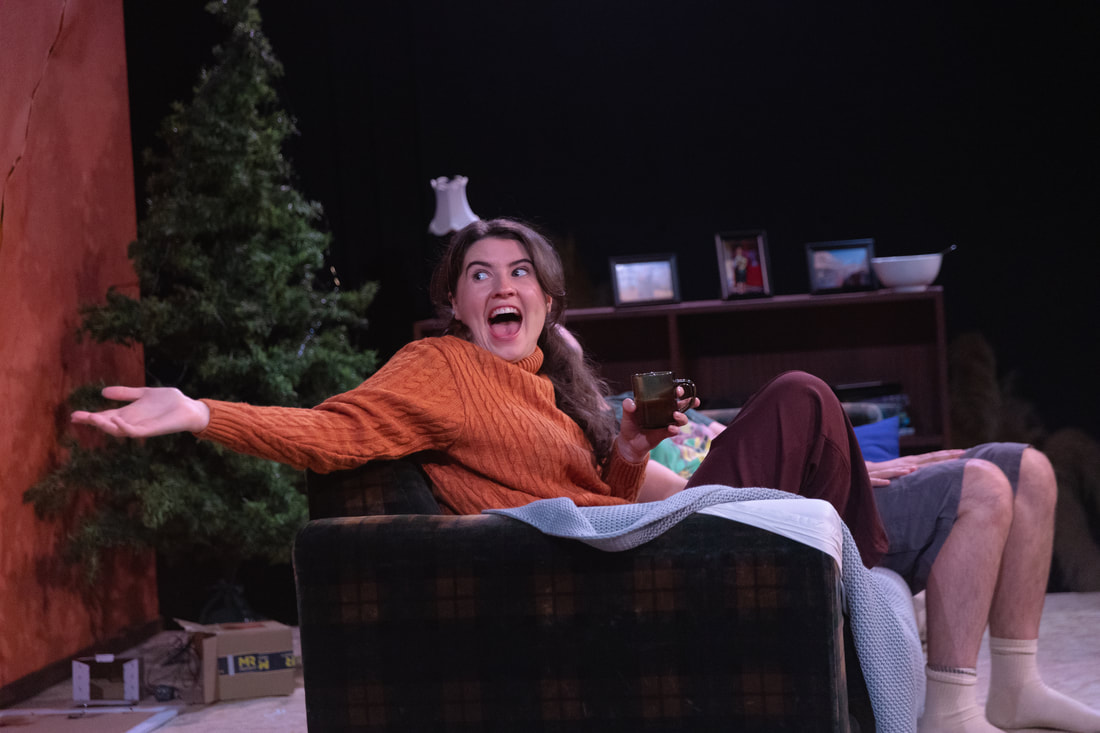Jack McGee
Looking out at the set of Homemade Takeaways and seeing everything but the kitchen sink, I am more than a little nervous. With a strictly naturalistic setting of a South Island lounge, there are no smoke and mirrors in sight. The performers and the play have nowhere to hide. If this falls apart, it’s going to be a long night for me and a borderline eternal one for them.
Thank fuck it doesn’t.
Homemade Takeaways is an impressively well paced play about an unconventional family coming home for Christmas. Seemingly set contemporaneously but pre-pandemic, it follows four young people, three of which are dealing with the loss of a shared loved one. Throughout the play we watch these four characters wrestle for control of their lives. They are all at various degrees of implosion, some seemingly of their own volition, others having had their agency and self robbed from them in the cruelest of ways. The real surprises of the play come from this struggle, in the sheer idiosyncrasy of the things characters cling to and the tiny tragedies of what they leave behind.
In an era where countless narratives put to stage and screen claim to be about exploring trauma, it’s no small triumph that Homemade Takeaways actually succeeds at doing this. It is genuinely interested in the process of coping. Characters practice mindfulness techniques like they’re normal everyday things instead of the silver-bullet-depression-solving-solutions they’re portrayed as in some Fringe shows. Despite its fair share of yelling, there’s nothing sexy or dramatic about the grief here. You get the feeling that these are four people living with real weight on their shoulders, desperately fighting for a way forward.
It’s not an easy play to perform and in the first act, the cast struggle a little under the weight of it. Ironically, for the first twenty or so minutes the performers seem to be fighting more for control of the text than with their characters' various turmoils. The script’s borderline excessive amount of pop culture references serve as minefields, easy punchlines for the performers to get stuck on. But as the play progresses, the cast finds their feet, and we relax into it with them.
Kate Johnstone shines as Annie, a character who appears so meticulously put together that you quickly gather her life must be in shambles. A self-help academic with a recently deceased father, it’s immensely engaging watching Annie struggle under the burden of her own expectations, lashing out at those around her, and tearing into herself. The vernacular of self-help lends her a uniquely revealing way of talking but ultimately she shines strongest in moments of silence. Scattered throughout the play are intimate interludes of Annie trying to regain control of herself, via physical actions which resemble something in between a mindfulness technique and an attempt at self strangulation. They share DNA with Holly Hunter’s crying scenes in Broadcast News, small peeks behind the intricate curtain these characters use to shield their inner lives.
Annie’s brother Will, played by Dryw McArthur, is the exact opposite of his sister. A disheveled ex-drummer ex-chocolate factory employee, his edges are so plainly jagged that you’re fooled into thinking he has everything on the table with nothing to hide. McArthur easily has the most difficult material of the play to work with and without diving into spoilers, he excels. Along with one particularly emotional act of spectacle in the second act, I am most taken by how aptly he demonstrated the difficulty of verbalizing a traumatic event. Will is a man who gets many words caught in his throat, and McArthur is not afraid to let them wriggle around in there.
One of the plays' great dramatic choices is that the siblings' step-mother Carol, played by Tabatha Pini-Hall, is barely a few years older than them. Recently widowed by the siblings' father, she is completely bewildered as to who she is meant to be to her step-children. Is she their mother? Their friend? Their child? She’s a people-pleasing primary school teacher with an inability to help herself and to make matters even more complicated, she’s inherited the family home. It’s a difficult character to perform, pivoting between different levels of status constantly throughout the play, deftly navigating the thin line between sincere kindness and condescension. While Pini-Hall is more than up to the challenge, she definitely shines more in the second half of the play, where she gives some absolutely killer monologues.
Paul, played by James Cain, is the odd character out. With no familial connection to the others, nor relationship with their dead father/husband, he’s living on Carol’s couch as a hybrid friend and support person. Playing on the tropes of the deadbeat couch surfing flatmate (think Notting Hill), Paul subverts expectations by actually making you understand why people tolerate him. Obsessed with Emma Thompson, he serves as comedic relief for the audience, and slacker-life-advice-guru for the characters of the play. Cain plays him with such absurdly infectious warmth, you never doubt for a second why the others would want him around, even at his most annoying. At times, he does feel like more of a narrative device than a person, pulling drama out of the other characters through pivoting between being a stand-in for their dead father/husband, and a 31 year old man-child they need to explain things too. This isn’t really a negative however as he’s very effective at this task, and Cain feels easily the most comfortable on stage of the performers. He is full-on Tom-Hanks-in-a-Nora-Ephron-movie-lovable from the moment the lights come up, until the curtain call.
That all being said, the play does struggle to wrap itself up. A few of the closing moments come across as contrived, and while the tone of the ending is mostly earned, it plays a tad sentimental. Its biggest crime is knowing how great its set-ups are and milking them one too many times, ending up being too much of a good thing.
Alongside this, I was somewhat cold on the set (designed by Rosie Gilmore). Styled as a semi-naturalistic lounge with an excellent elevated wooden deck/floor, furnished with a kitchenette, a couch and somewhat surreal golden cracks bursting out of a dull orange back wall, the set suffers from the but part of everything but the kitchen sink. By going for a naturalistic approach, our eyes are drawn to the compromises. The kitchenette is unrealistically tiny and literally doesn’t have a sink. The cigars smoked by characters are vapes painted brown. The grocery bags brought home by Carol after a bustling pre-Christmas shop are oddly empty. Alongside this, the metaphor of the cracks on the back wall feels like it belongs to a different play. The family here is barely connected to begin with, they are all cracks, no surface.
All of that aside, I can say wholeheartedly that Homemade Takeaways is unrelentingly entertaining. It is laugh-out-loud funny while still giving you things to chew on, goes down easy without being junk food. All of this, along with its brisk pacing, are a credit to its director Cassandra Tse, and its scriptwriter Ben Wilson. You owe it to yourself to see all glorious one hundred and thirty five minutes of it.
Homemade Takeaways is on until the 3rd of December - find your tickets at the BATS website.
(Disclaimer - I’m friends with two of the people who worked production roles on this show, and run a theatre company with one of them. While neither are front facing, or affect anything I talked about in the review, it’s worth noting my biases there.)







